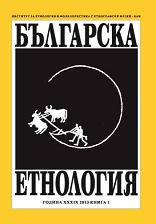Традиция и идентичност в условията на европейска трансгранична мобилност
Tradition and identity under the conditions of the European trans-border mobility
Author(s): Petko HristovSubject(s): Anthropology
Published by: Институт за етнология и фолклористика с Етнографски музей при БАН
Summary/Abstract: The paper is focused on modern ideas about the traditional culture of the Balkan nations and more specifically concerns the contemporary Bulgarians. The basic problem considered by the author is the following: Where does the tradition end and where does its modern interruption begin? According to the author, in the Balkan ethnology, it is time to revise some inherited ideas about “tradition“ as a very important historically formed component of culture. The last two decades are marked by the essential change in the understanding of “tradition“ as a modern interpretation of our national cultural past, gradually accepted in the Bulgarian ethnology as well. A number of studies illustrated how the national culture is “up-dated“ and modernized, how our cultural past is interpreted – a past that is common for all Balkan nations for centuries, accepted and transmitted by each successive generation to the next according to a unique model, thus shaping its own identity. A number of studies carried out in the last decades contributed for transforming the inherited from the past view of the “national tradition“ as a fixated cultural heritage from the pre-modern age. In the modern age, in a dynamic process of globalization at the beginning of the XXI century, the understanding of “tradition“ as a heritage from the culture of the pre-modern village is subjected to a radical change and drastic transformations. In contemporary ethnology marking something as “tradition“ is turned into an act of interpretation, a way of selecting and designating. The understanding of “tradition“ as attitude and assessment of a given generation towards its own past and towards the culture from this past in particular, could be turned into a substantial research and pedagogical strategy.
Journal: Българска етнология
- Issue Year: 2013
- Issue No: 1
- Page Range: 7-14
- Page Count: 8
- Language: Bulgarian

